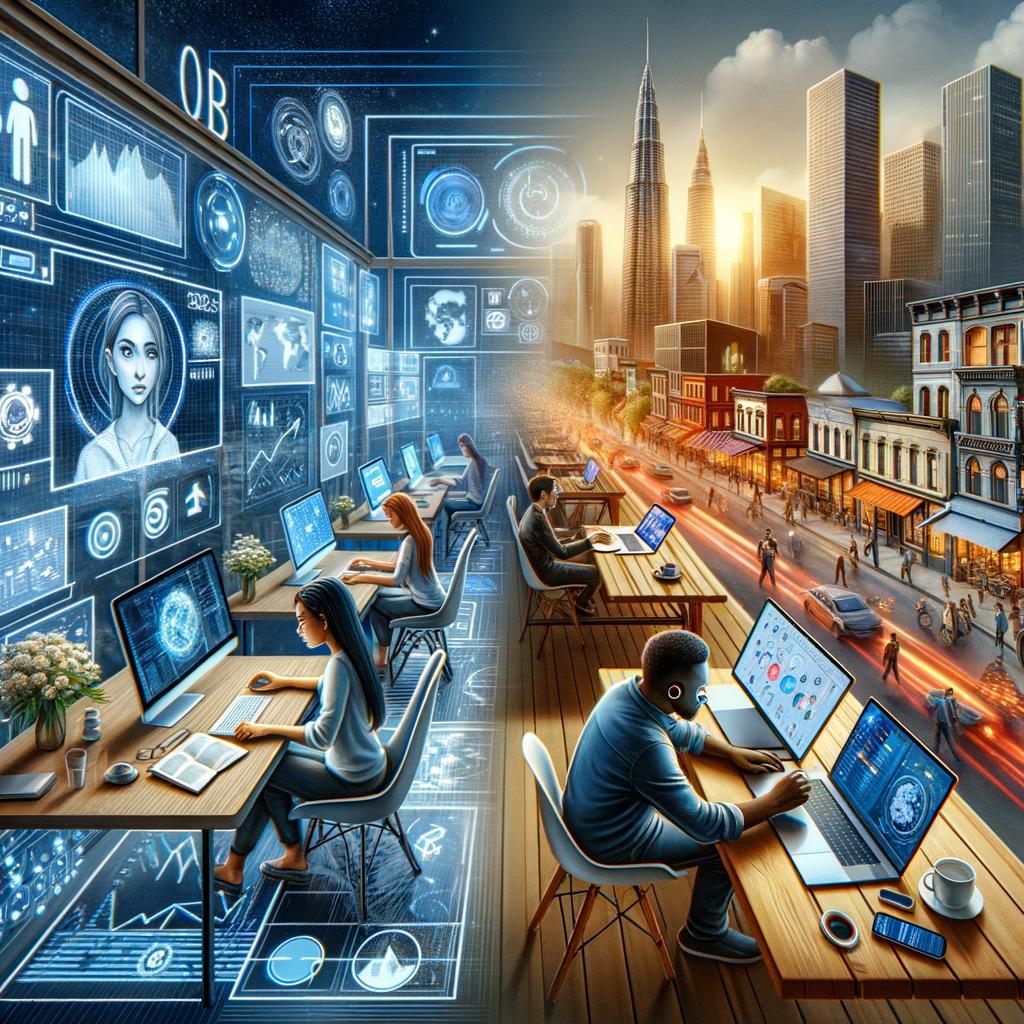In exploring the future of work: remote work and the gig economy, we’ll delve into a transformative paradigm shift in our labor market. As advances in technology, increased globalization, and shifting employee expectations bring dramatic changes to our employment landscape, two emerging trends are taking root – remote working and the proliferation of the gig economy. This article aims to provide a comprehensive understanding of these revolutionary trends that are reshaping how we perceive work.
It describes how remote work has gained immense popularity by offering numerous benefits such as flexibility and improved work-life balance while tackling associated challenges. The dynamic gig economy will also be detailed, highlighting its flexible and on-demand nature, navigating potential complications, and laying out its possible trajectory in the future world of work. Join us as we journey through this intriguing exploration of our impending professional reality.
Remote Work
This paradigm shift offers a range of potential benefits for both employers and employees. Employers can cut costs associated with maintaining physical office spaces and utilities while tapping into a global talent pool unrestricted by geography. The employee advantages are also multifaceted – increased flexibility can lead to an enhanced work-life balance, less commuting stress, and higher job satisfaction.
However, remote work presents its own set of challenges that organizations must address. Communication barriers can develop without face-to-face interaction, sparking feelings of isolation among workers which can subsequently impact teamwork and productivity. Ensuring accountability is another concern as managers cannot directly supervise their team’s daily activities leading to potential trust issues.
Regardless though, various tools and strategies are being utilized to manage these obstacles effectively; from project management software like Asana to communication platforms like Slack as well as methods such as regular video meetings and setting transparent expectations to ensure everyone remains on the same page despite distances or time zones.
| Benefits | Challenges |
|---|---|
| Increased Flexibility | Communication Barriers |
| Decreased Overhead Costs | Ensuring Accountability |
| Enhanced Work-Life Balance | Potential Isolation |
The Gig Economy
Deciphering the Gig Economy
The gig economy has emerged as a significant player in labor market trends, fueled by technology and the evolving definitions of work. It encompasses a range of workers – from freelance professionals, self-employed consultants, to individuals involved in sharing economy platforms such as Uber or Airbnb.
In essence, the gig economy is marked by temporary or flexible jobs where people are paid per task or assignment – ‘the gig’ completed – rather than receiving a regular wage. It occurs when routine full-time jobs are replaced by short-term contracts or freelance work.
Gigging: Pros and Cons
The rise of the gig economy comes with its own set of advantages and disadvantages. On one hand, it offers flexibility that typical 9-5 jobs fail to provide. Workers can control their schedules, locations and the type of work they engage in.
- Flexibility: The key reason why many opt for gig work is the ability to choose when and how much to work.
- Earning potential: Some gigs can be quite lucrative and may even become a gateway to entrepreneurship.
On the other hand, this tendency towards transient employment can lead to income instability and lack of job security which impact long-term financial planning.
Similarly, while chance encounters with bosses and coworkers over water-coolers might seem trivial, these meetings often help establish strong professional networks – an opportunity which freelancers often miss out on.
The Gig Economy’s Big Players and Government Regulations
Digital platforms like Uber, Airbnb, Freelancer have revolutionized traditional industries-transportation, hospitality and workforce marketplace respectively. They have capitalized on technology to match supply with demand efficiently making way for a robust gig economy that indicates how strong the trend towards “gigging” really is.
In terms of regulation shaping the future of work specifically for the gig economy, much of it hinges on policy changes that reconcile with the shifting nature of work. Key policies that need to evolve include worker protections such as health insurance, retirement plans and job security. Active conversations and shifts are occurring in these areas to better accommodate, recognize and protect gig workers.
The evolution of these policies would undoubtedly assist in framing a better future for ‘gigging’, and thus shed light on what the future of work: remote work and the gig economy holds for both individuals and businesses.
Concluding Thoughts on the Future of Work
In conclusion, the future of work: remote work and the gig economy is poised to revolutionize many aspects of our workforce. The shift towards a more digital, flexible labor market promises to bring unprecedented changes in how we conceive and structure work. Benefits such as increased freedom, flexibility, and maximized productivity are hard to ignore. However, challenges related to communication, accountability, income instability, and diminished worker protection also come with this new frontier.
Preparation and adaptation will be key for individuals, businesses, and governments alike as these changes disrupt traditional labor markets. By fostering innovation and embracing remote work practices coupled with creating comprehensive regulatory frameworks for gig workers; stakeholders can navigate this transformation productively. The economic models of tomorrow are being shaped today by technology, evolving demographics, as well as worker expectations.
Therefore, an open conversation about these changes will enable us to harness its benefits while mitigating potential risks it presents. Undoubtedly though the future brings its challenges but adapting early might just transform these into opportunities for a brighter tomorrow.

Leave a Reply